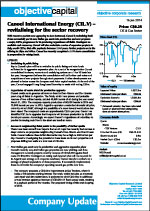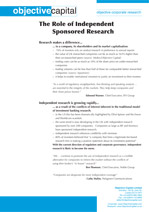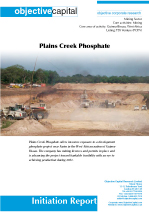Canoel International Energy (CIL.V) - revitalisation on track; acquiring cogen plant
 Update by Objective Capital , Apr 21, 2014
Update by Objective Capital , Apr 21, 2014
![]() Download full report
Download full report
Click for previous reports on this company
Questions?
| 
Key Points:
-
Gas production at San Teodoro is slated to commence imminently
Canoel has followed through with its improvement plan for its 100-percent-owned San Teodoro field. Production from San Teodoro, which had historical production of 8,500 cubic metres per day during the early 1990s, is expected to commence at 5,000 cubic metres per day by the end of April. This will increase significantly when Canoel brings a second sandstone unit to production in 2017. Historical estimates put the gas in place at San Teodoro at 37 million cubic metres, with a recovery factor of 21.2 percent. Canoel reports further upside at San Teodoro, with a new prospect, Macchia Nuova, having been identified through seismic work. Initial company estimates assign a prospective, non-compliant resource of 38.4 million cubic metres of natural gas to this prospect. -
Canoel plans production at Canaldente within a year
The company’s strategic plan for Italian gas production hinges on it having several concurrently producing fields. A second new prospect is slated to come on line in the first quarter of 2015. The Canaldente field holds an estimated 50 million cubic metres of gas in place, with 21 million cubic metres believed recoverable, in two distinct sandstone units. Canoel projects production of 10,000 cubic metres per day from the two units at Canaldente. -
Other improvements remain key to Canoel’s success
Management continues to seek ways to maximize cash flow. The company is currently negotiating the acquisition of a cogeneration plant that will allow the company to generate and sell electricity to the Italian grid. Canoel currently sells natural gas to the plant owner. Also, as laid out in our previous update, Canoel plans several other improvements with its Italian gas assets that are projected as significant sources of cash flow in the coming years as sufficient investment capital is available. These include improvement work at Masseria Petrilli (50 percent w.i.) later this year, a more energetic $0.95m expansion at the larger Torrente Vulgano property (100 per cent w.i.) slated for late this year, and an aggressive $C2.5m expenditure at Masseria Vincelli, slated for mid-2015. -
Ukraine crisis has highlighted Europe’s dependence on gas imports
In the wake of the political crisis in the Ukraine, there is a renewed focus on gas supplies in Europe. This is no different in Italy and may herald the beginning of a more supportive approach by government. -
Proposed upgrades to Argentinian oil assets are a vital cog in Canoel’s plan
Canoel continues profitable production from its Don Alberto and Don Ernesto oil fields in Argentina. The fields, which have proven and probable reserves of two million barrels, yielded 40,000 barrels of oil during the year ended March 31, 2013. We believe production for the fiscal year ended March 31 2014 will approach 50,000 barrels, a significant increase but some 10,000 barrels less than forecast. Management projects production of 75,000 barrels the following year; we have adopted a more conservative assumption of 65,000 barrels. -
Success in neighbouring fields points to the possibility of further upside
Canoel believes that an expenditure of C$1.1m on conventional upgrades will boost production by up to 35,000 barrels per annum. This would further increase cash flow in the medium term but the real story told by management involves a more aggressive plan. Unconfirmed reports indicate an oil major has successfully drilled deep horizons on properties neighbouring Canoel’s Don Alberto and Don Ernesto fields. Canoel believes these discoveries may have yields as high as 500 barrels per day. Canoel is investigating the potential at these levels on its own properties and proposes drilling two wells at a cost of C$6m. -
Available cash will guide direction and timing of Canoel’s plan
The junior resource sector has been plagued by slumping markets and a tight supply of venture capital since the recession began in 2008. Whilst there are only the faintest harbingers of a new exploration spring, they are nonetheless a welcome sight. Canoel successfully closed a C$0.1m placement at C$0.25 in February and the following month it engineered a share-swap with London-based Global Resources Investment Trust, through which it acquired 222,000 GRIT shares with a deemed value of £1 in exchange for 1.6 million Canoel shares at C$0.25. Whilst the two cash raises are a small fraction of what the company needs, they are encouraging signs management will be able to raise larger sums without undue dilution. -
Management continues to seek blue-sky opportunities elsewhere
Canoel is currently considering bidding for several petroleum permits in Nigeria as part of its African strategy. Bids are not due to be submitted for several months and should they be successful are unlikely to result in a formal acquisition until 2015. Nevertheless, the company believes Nigeria presents a great opportunity. As well, Canoel management is in discussions for petroleum permits in Azerbaijan, with potential acquisitions on a similar timeline. -
Valuations remain attractive despite continuing times of market distress
Our revised valuation model, based on current production augmented with the proposed expansions over the coming year, estimates Canoel to be worth C$2.12 per share in the base-case scenario. Achieving this valuation will require raising considerable capital in very difficult markets, which if indeed possible, is likely to be highly dilutive. We continue to reflect the impact of this in our distressed valuation. Based on the necessary dilution to achieve its development plan, we estimate Canoel to be worth C$0.38 per share to current shareholders in today’s market. Should management succeed in raising cash for the proposed Argentinean and Italian upgrades as planned, our optimistic assessment values the company at C$0.76 per consolidated share.
While there has been a substantial increase in our valuation of Canoel’s Argentinian assets based on their improvement plans and planned drilling programme, the impact of the necessary dilution limits the benefit to current shareholders. Despite this, even after the potential dilution current shareholders will benefit from the planned developments. Should the company successfully raise capital at higher than expected share prices, our base-case and optimistic valuations would be commensurably higher.













